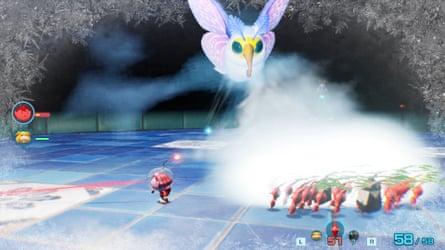As I survey the garden from my miniature spaceship – watching a team of minions breaking down a brick wall over there, another transporting treasure (a discarded rubber duck) back to base, and a third lot building a clay bridge – I feel a sense of peace and mastery, but also nagging annoyance. In real life I am the sort of person who forgets meetings and appointments even when they happen at the same time every week, can’t multitask, and I am continually, unpleasantly surprised by how few hours I have at my disposal and how much there always is to cram into them. Why can’t I manage myself half as well as I manage this virtual garden? Perhaps what I need is an army of tiny plant people as personal assistants.
Pikmin are cheerful, obedient creatures, colourful sprouts with eyes, some with noses and little boulder bodies. Each breed of them is suited to different tasks, such as digging, swimming or walking across hot lava on their tiny feet. You, a tiny spaceman, are part of a research and rescue crew that has crash-landed on a suspiciously Earth-like planet, and the Pikmin take a shine to you, allowing you to command them with your whistle in battles against garden beasties and an endless search for treasures. The descriptions of these finds are a highlight: in the minds of these tiny alien researchers, that toy duck becomes a Stately Rubber Cutie, a tennis ball a Sphere of Fuzzy Feelings. Do spend some time in the treasure catalogue – it is guaranteed to make you smile.
Since its first entry on the Nintendo GameCube in 2001, which was apparently inspired by designer Shigeru Miyamoto’s newfound gardening hobby, Pikmin has evolved from a small-scale garden study into a miniature planetary adventure. There are many more places to explore, and you do it alongside a bigger team of alien astronauts, who make you gadgets and set you strategic challenges. Each garden or beach diorama is home to caves, discrete puzzle-boxes that test your strategic mettle with mazes and threatening enemies, and you can explore them at night-time as well, when they transform into tower-defence challenges, a scramble to protect your base from emboldened carnivores.
If the piano music and ambling critters make this game seem cute and smoothing, be advised that it is in fact Parental Anxiety: The Video Game. I yelped with dismay when I sent a team of ill-equipped Pikmin charging at an unfamiliar creature and it unexpectedly electrocuted them to death. Pikmin 4 isn’t all that challenging, in that it’s easy to replenish your plant-people’s numbers (or rewind time to save them from their fate), and most foes can be defeated by simply flinging an overwhelming number of Pikmin at them. But the way I felt when I lost even a few of them to some evil-looking bird or belly flopping frog meant that I was always trying to avoid sending them on suicide charges, looking for more strategic ways to move forward instead.
A great thing about Pikmin 4 is that it gives you lots of ways to make the game easier, but doesn’t force you to use them. Gadgets help you round up lost minions; your pet dog can follow scents to unearth hidden treasures; bombs and mines and freeze-rays can help in combat. There is also a co-operative mode that lets a second player chuck pebbles around while you get on with things, which feels weak, considering that the option to let one player control the astronaut and another control the dog is staring us in the face. Given that Pikmin is all about time management and division of labour, though, another player might introduce too much of an element of chaos if they were given too much agency.
I spent my first few hours with this game feeling mildly irritated by how slowly I was being introduced to new Pikmin and new places to lead them around, but – sorry – Pikmin 4 really grew on me. As your base expands, so do your options – even once the “final” battle is over, there is an enormously generous swathe of newly unlocked things to do. Whether you have been following the series since the early days, or you’re brand new to it, rest assured, this is as good as it has ever been.
The emotional core of the game remains the interdependency between you and the Pikmin, and the sense of responsibility and gratitude that you feel towards them. Walking through my local park after playing it for a day, I felt that if I crouched down under a tree and remained still, I’d see little lines of them ferrying things around among the ants and beetles. The most memorable games are always the ones that inject a little magic into your every day life.
after newsletter promotion

